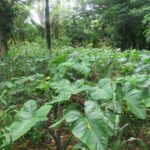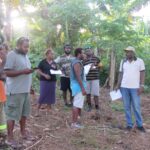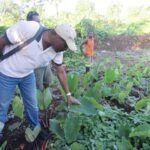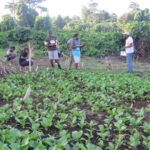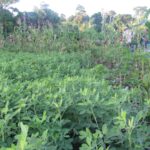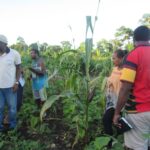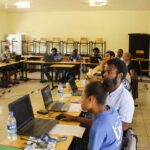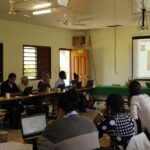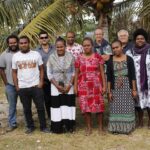Projects
PIURN projects led by the University of the South Pacific:
Principal Investigator: Associate Professor Mansour Assaf- STEMP
A wearable wireless assistive technology allows persons with disabilities to operate home appliances without using a physical handheld remote control. The proposed technology enables people with severe disabilities to interact with and control their environments simply by moving their tongues. The remote control tongue-based assistive system could help individuals with severe disabilities lead more independent lives. The proposed project, once completed, would have social and cultural impact in the South Pacific islands. Project outcomes will be presented in regional and international symposiums and published in ranked proceedings and journals.
Duration: 2024-2025
Funding: FJD$20,000.00
Partners: National University of Samoa Professor Ioana Chan Mou
Principal Investigator: Dr Philip Obaigwa Sagero – SAGEONS
This study aims to investigate the climate resilience of livestock production in the South Pacific region using Fiji as the case study. Livestock is critical to food security in the South Pacific region. The goal of livestock production is to enhance the health and wellbeing of the population of a nation through food security, healthy food, and as a source of income. There is a need for a more climate-resilient livestock sector; these require consulted efforts between farmers, government agencies, commercial industries, and researchers. Understanding the impacts of climate change, adaptation, and mitigation strategies on livestock production is key to a resilient livestock sector. This study provides insight into trends in livestock production in Fiji, the negative impact of climate change and weather extremes, Institutional framework for climate change support, and provide recommendations for climate-resilient livestock production.
Duration: 2024-2025
Funding: FJD$19,962.00
Partners: Fiji National University Associate Professor Royford Magiri
Principal Investigator: Dr Levente Orban – SOLASS
This proposal outlines an investigation at the intersection of mental health, biosensor data acquisition, and machine learning models using Post-Traumatic Stress Disorder (PTSD) as the model condition. The theoretical approach of this project is embedded in the Research Domain Criteria (RDoC) initiative by the National Institute of Mental Health (NIMH, USA). We apply this framework to estimating gradation from a healthy psychological state to anxious and depressive states caused by PTSD through the acquisition of time-series biosensor data and the application of dimensionality reduction and machine learning algorithms. The aim of the proposed study is to use wearable noninvasive biosensors and machine learning algorithms to estimate mental states that result in PTSD. The potential impact of this research is to deploy affordable and accurate technological solutions that can penetrate remote villages and regions without clinical expertise.
Duration: 2024-2025
Funding: FJD$20,000.00
Partners: Fiji National University; University of Ottawa
Principal Investigator: Dr Dr Vikas Gupta – SBM
This research project investigates the sustainable practices of hotels and resorts in Fiji, with a multifaceted approach aimed at understanding and evaluating their impact on local communities, the environment, and guests from various nationalities. A significant part of the research is dedicated to investigating how these hotels and resorts engage with local communities. This involves evaluating the effectiveness of their initiatives in preserving cultural heritage, providing economic benefits to local people, and enhancing the overall tourism experience. The study focuses on identifying the green attributes of hotels that influence guests’ decisions to participate in eco-friendly practices, examining the factors that motivate or discourage their engagement in sustainable tourism.
Duration: 2024-2025
Funding: FJD$15,990.76
Partners: Fiji National University Dr Sunil Kumar Sinha
Principal Investigator: Dr. Francis Mani
This study aims to investigate air pollution in major cities in the Pacific like Suva, Lautoka and Noumea using continuous PM2.5 samplers and also bio-indicators such as lichens. Suva city is one of the fastest growing cities in the South Pacific region that has seen recent increase in traffic on the road. This study aims to provide insights into the impact of traffic and industrialization on air pollution.
Apart from traffic and industrial pollution in Lautoka and Noumea there are other anthropogenic activities like sugar cane burning in Lautoka and nickel mining in Noumea that could seriously impact PM2.5 concentration and composition that could have adverse effect on human health. A detailed elemental analysis would be performed on PM2.5 aerosols using the state of the art ICP-OES instrument at the University of New Caledonia to undertake source apportionment studies.
Duration: 3 years from October 2017 to October 2020.
Funding: FJD$59,500.00.
Partners: University of New Caledonia, University of Massachusetts.
Principal Investigator: Dr. Morgan Wairiu
The proposed research study will focus on evaluating the effectiveness of adapting strategies used to address climate change impact on atoll islands and other selected Solomon Islands communities as prioritized in the Solomon Islands National Adaption Programme of Action 2008 and align with lessons learned and experiences from implementation of the NAPAs in the four other Pacific LDCs. A detail and comprehensive evaluation will be conducted on the specific key priority areas in Solomon Islands NAPAs. This includes:
- Managing the impact of and enhancing resilience to climate change and sea level rise on agriculture and food security, water supply and sanitation, human settlements, human health and education, awareness and information and,
- Climate change adaption on low –lying and artificially built up islands in Malaita and Temotu provinces.
Duration: October 2017- October 2018
Funding: FJD$46,150.00.
Partner: Solomon Islands National University.
Principal Investigator: Dr. Krishna Kotra
Project overview: The proposal is to investigate the quality of drinking water resources in Efate and outer six islands which were badly hit by natural calamities. This is supported by the concerns voiced by the communities about the decline in the water quality of these resources and their reports of changes in turbidity, salinity, fecal contamination, gastrointestinal aliments, etc. This was also in line with the longstanding thought to framework national standards by Govt. in Vanuatu.
The proposal besides investigating the water quality is also aimed in providing training for various Govt. department staff, NGOs, USP staff/students besides community leaders. Survey, sampling, analytical interpretation, policy making sessions along with field work would be the part of the research study.
Duration: 2 years
Funding: FJD$43,311.00.
Partners: The Papua New Guinea University of Technology, Government of Vanuatu, University of Auckland, University of New South Wales.
Principal Investigator: Dr. Sonny Lameta
This proposed project concerns the interactions and mutual influences of food production from traditional Melanesian and Polynesian family gardens and quality diets, and thus community health in Pacific societies. This food production, and ultimately food security, is intimately tied up with village lifestyles and the traditional cultures and knowledge systems of our rural people, but is being jeopardized by a range of factors such as population growth, urbanization, alienation of land for other purposes and ignorance on the part of the policy making political and business elite, with a focus almost exclusively on the market. The availability of quality land per head of rural population and soil fertility are declining and this has dietary consequences leading to such issues as non-communicable diseases and poor health outcomes. There is a necessity to document and quantify these issues to inform policy makers and activists, as well as educate farmers and service providers.
Duration: 2 years
Funding: FJD$48,000.00
Partners: Solomon Islands National University, University of Goroka, University of New Caledonia, Caledonian Agronomical Institute.
PIURN projects led by the University of New Caledonia:
Principal Investigator: Pr Virginie de Barnier – LARJE
This project aims to enforce closer collaborations between French-speaking countries (in particular New Caledonia) and English-speaking ones; furthermore, the project is based on an interdisciplinary approach, involving marketing, economics, law and cultural anthropology. Furthermore, it intends to adopt a collaborative methodology, through the involvement of local partners and stakeholders and through a bottom-up dynamic.
Duration: 2024-2025
Funding: 1,500,000 XPF – 30,600 FJD
Partners: The University of South Pacific, National University of Vanuatu, University of French Polynesia, James Cook University
Principal Investigator: Dr Pascal Dumas
Continuing the acquisition of the necessary databases for the analysis of contemporary morpho-sedimentary dynamics at multiple scales on low-lying coasts marked by issues), in order to “feed” and sustain the observatory.
– Providing an interpretation of the multi-scale observations made using available environmental data through a dialogue between the scientific knowledge of the project team and the local knowledge of the populations in the studied areas.
– Involving managers, decision-makers, customary leaders, and local communities, with a particular focus on school education, in a dual approach: a) contributing to the databases to be established through the participatory shoreline measurement network, and b) engaging in shared discussions about potential solutions to be implemented based on the measurements taken, with a strong emphasis on the involvement of local knowledge.
Duration: 2024-2025
Funding:
Partners: National University of Vanuatu, Mayotte University, Cote d’Opale University, Nantes University
Principal Investigator: Pr Patrick Roger – LARJE
The aim is to develop a network of researchers in the South Pacific to undertake projects aimed ultimately at improving the economic and financial education of young people (mainly secondary school students) in the region. The initial stage consists of collecting data on the financial literacy of young people in Oceania (New Caledonia, New Zealand and Fiji), their cognitive abilities and their socio-demographic characteristics. The second objective is to analyze the data collected in order to achieve the objectives described above. The results of this project will also be used to study and understand the socio-economic, educational success and gender inequalities that can exist from an early age, as well as to provide input for public educational policies in the economic and financial fields.
Duration: 2024-2025
Funding: 960,000 XPF – 19,600 FJD
Partners: The University of South Pacific, National University of Samoa, Fiji National University
Principal Investigator: Dr Virginie Soula – TROCA
Publish a bilingual (English/French) anthology of contemporary literary texts (2000-2023). The aim is to offer a selection of emblematic texts from English- and French-language literature in the Pacific (Australia, Fiji, Hawaii, French Polynesia, New Caledonia, New Zealand, Vanuatu), exploring the major issues facing the Pacific today.
Duration: 2024-2025
Funding: 1,500,000 XPF – 30,600 FJD
Partners: The University of South Pacific Dr Lorenz Gonschor, Dr Sudesh Mishra ; The University of French Polynesia: Dr Titaua Porcher, Pr Sylvie Largeaud-Ortega, Dr Andréas Pfersmann and University of Auckland
Principal Investigator: Dr Olivier GALY
The Knowledge, Indigenous Practices and Resilience in the Pacific Islands (SPAR-Pacific) project focuses specifically on family perceptions and practices among New Caledonian and Vanuatu students and their families in 2022 in the Post COVID-19 Pandemic context. The interdisciplinary project worked on:
- Measuring the existence and activation of traditional knowledge and practices among New Caledonian and Ni-Vanuatu students.
- Appreciating the associated perceptions and intangible aspects of youth
- Understanding the modes of development, expression, and transmission after the COVID-19 pandemic in relation to the socio-economic and natural environment of young people
Duration: 2020-2022
Funding: 12 570 euros
Partners: National University of Vanuatu
Principal Investigator : Dr Nicolas LEBOUVIER
The genus Xanthostemon belongs to the Myrtaceae family which contains about fifty plant species distributed across Papua New Guinea, Australia, Indonesia and New Caledonia. The leaves of Xanthostemon produce essential oils, that can be utilized as a renewable chemical resource. An Australian study showed that some Australian species have unique compositions with aromatic molecules and β-triketones, while others have a more traditional composition of terpenoids. β-triketones having methyl substituents on a 6-membered ring with an acyl side chain and possess important antimicrobial and insecticidal activities. To date, there is no data on the molecular composition of species from New Caledonia and Papua New Guinea. Leaves of various Xanthostemon will be collected and extracted using steam distillation techniques. The objectives studied are:
– Compare the composition of essential oils and identify chemotaxonomix markers in species of the genus Xanthostemon from Australia, Papua New Guinea and New Caledonia
– Evaluate the antimicrobial and insecticidal activity of essential oils and isolated β-triketones and understand their evolutionary role in the biotic interactions between plants, insects ans associated microorganisms
– Modify the molecular structures of β-triketones in order to study their broader structure-activity relationships.
Duration: 2020-2022
Funding: 25 140 euros
Partners: PNG Unitech, New Caledonia Pasteur Institute, James Cook University
Principal Investigator: Prof. Jean-Marie Fotsing
AASIP 2 followed the successful FALAH (Family Farming, Lifestyle, and Health) project, that was awarded 1.3 million euros from H2020-MSCA. This project was designed to support the implementation of the FALAH project, especially regarding research on the different sites (Fiji, Solomon Islands, Vanuatu and New Caledonia)
Duration: 2019-2021
Funding: 20 385 euros
Partners: The University of the South Pacific, Solomon Islands National University, New Caledonia Institute of Agronomy (IAC), French Research Institute for Development (IRD), Vanuatu Agricultural Research and Technical Centre (VARTC)
Principal Investigator: Dr. Valérie Burtet-Sarramegna
Hyperaccumulators are unusual plants that accumulate particular metals or metalloids in their living tissues to levels that may be hundreds or thousands of times greater than is normal for most plants. Most reported hyperaccumulator plants are for nickel and occur on ultramafic soils that are naturally enriched in nickel, cobalt and manganese. However, many hyper-accumulators have not been studied or described yet. The goal of the present project is to study and compare hyper-accumulating species from Australia, Fiji and New-Caledonia using multidisciplinary approaches in order to gain a global knowledge of the uptake, biotransformation and distribution of Ni in hyperaccumulators; a step which is critical in understanding the processes of metal acquisition and metal tolerance.
Duration: 2019-2021
Funding: 16 760 euros
Partners: The University of the South Pacific, University of Queensland, New Caledonia Institute of Agronomy (IAC), IRD (Research Institute for Development).
Principal Investigator: Prof. Frédérique FLOUVAT
DURVIS follows-up the SOSPADIS project with the aim to study informal settlements in Vanuatu and in the Solomon Islands and collected date on urban dynamics in the two countries.
Duration: 2019-2021
Funding: 16 760 euros
Partners: The National University of Vanuatu, Solomon Islands National University, French Research Institute for Development (IRD)
Principal Investigator: Dr. Valérie Burtet-Sarramegna
Hyperaccumulators are unusual plants that accumulate particular metals or metalloids in their living tissues to levels that may be hundreds or thousands of times greater than is normal for most plants. Most reported hyperaccumulator plants are for nickel and occur on ultramafic soils that are naturally enriched in nickel, cobalt and manganese. However, many hyper-accumulators have not been studied or described yet, especially in Papua New-Guinea. The goal of the present project is to study and compare hyper-accumulating species from Australia, PNG and New-Caledonia using multidisciplinary approaches in order to gain a global knowledge of the uptake, biotransformation and distribution of Ni in hyperaccumulators; a step which is critical in understanding the processes of metal acquisition and metal tolerance.
Duration: 2 years (End 2017 – March 2019)
Funding: FJD$30,600.00
Partners: University of Queensland, University of Papua New Guinea, Caledonian Agronomical Institute, IRD (Research Institute for Development).
Principal Investigator: Dr. Mathieu Bunel
The project aims to build a platform to access to individuals database for and by the Pacific in order to promote access to data, structure their use and disseminate the results to the scientific community. The first objective of the project is to constitute or participate with the SPC to the constitution of a numerical portal enabling access under conditions to a catalogue, as wide as possible to inquiries data on the Pacific islands region. The second objective is to structure a researcher’s community in order to promote the use and add value to studies using this local data. The creation of a dedicated website, the constitution of proper work studies and the organization of a one-day symposium aims to set out the studies realized thanks to the portal data or statistical methods or econometrical designed for data coming from small islands countries are contemplated.
Duration: 18 months
Funding: FJD$30,600.00
Partner: The University of the South Pacific
Principal Investigator: Prof. Géraldine Giraudeau
Creation of a visible bilingual academic network in order to mutualize current researches, creation of pedagogical useful supports to disseminate the results of these researches to students, universities staff, professionals, and to the public.
Duration: 18 months
Funding: FJD$41,000.00
Partners: The University of the South Pacific, Université du Mans.
Principal Investigator: Prof. Jean-Marie Fotsing
Interrogate and analyze agricultural practices in rural and urban area, evaluate the place and the importance of cultivated products in the alimentation to apprehend the alimentation consequences on population health and in priority on producers and their family. Focus on environmental, spatial and society’s basis, the project takes place on different fields chosen in the three partners territories. Looking for the link between demographic growth and the evolution of agricultural areas, evaluate and quantity cultivation plots and the species cultivated. Implementation of the inquiries questionnaire in order to product original data on the informal agricultural production portion in alimentary security.
Duration: 18 months (June 2018 – November 2019)
Funding: FJD$41,000.00
Partners: Vanuatu Ministry for Education and Training, Vanuatu Agricultural Research and Technical Centre, Divine Word University, Papua New Guinea University of Technology, IRD (Research Institute for Development).
Principal Investigator: Prof. Yves Letourneur
This project will response to essential concerns about contamination levels, and the diversity of species studied will enable also to evaluate the way the pollutants integrate their selves within food chain ending to commercial interest species.
Duration: 18 months (June 2018 – November 2019)
Funding: FJD$20,500.00
Partners: The University of the South Pacific
Principal Investigator: Prof. Frédérique FLOUVAT
Develop a new approach to model informal settlements growth in Fiji Islands and Vanuatu, and understand the socio‐spatial organization within the settlements. This approach intend to provide tangible information and scenarios that can help engineers and urban planners to plan informal settlements water related services and to test rehabilitation strategies.
Duration: 14 months (June 2018 – September 2019)
Funding: FJD$24,855.00
Partners: The University of the South Pacific, Massey University, Ecosophy (New-Caledonia).

